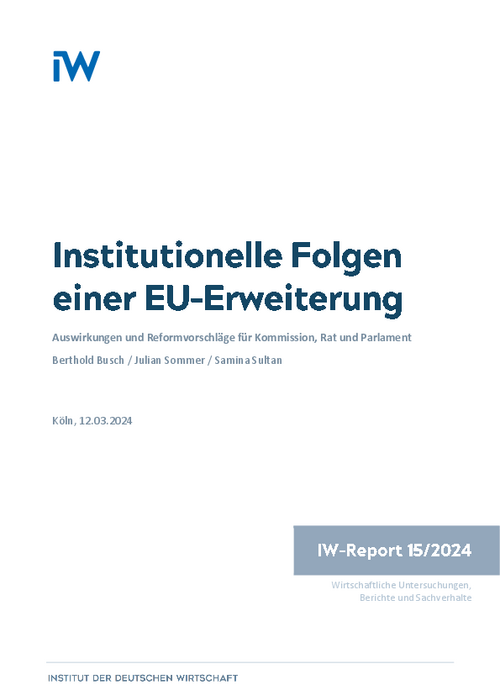At the latest since the Russian war of aggression in Ukraine and the decision to open accession talks with the country, the topic of enlargement has once again become much more important for the European Union (EU).

Institutional consequences of EU Enlargement

At the latest since the Russian war of aggression in Ukraine and the decision to open accession talks with the country, the topic of enlargement has once again become much more important for the European Union (EU).
The strategic dimension of enlargement has come to the fore due to the geopolitical situation. Enlargement could also help to make the internal market more attractive. However, the enlargement debate must always go hand in hand with the question of the EU's capacity for enlargement – and thus for reform.
The admission of up to eight countries is under discussion – in addition to Ukraine, these would be Albania, Bosnia and Herzegovina, Georgia, Montenegro, North Macedonia, Serbia and the Republic of Moldova. This would result in changes at various levels. This report discusses the consequences for the three central institutions of the EU – Commission, Council and Parliament – and puts forth recommendations for reforms to ensure their continued efficacy.
With the current framework, the European Commission would expand to encompass 35 members. IGiven the unlikelihood of member states relinquishing their right to appoint a Commissioner, a more hierarchical structure within the Commission appears to be the most viable solution.
The Council of the EU predominantly operates on a system of qualified majority voting in most domains. Enlargement to an EU-35 could shift the economic focus of the Council towards less economic freedom. This would make it more difficult for the more liberal bloc, to which Germany also belongs, to prevent decisions by blocking minority or to enforce decisions by majority vote.
Unanimity is required for decision-making in the Council in the areas of common foreign and security policy (CFSP) and tax policy. Yet, this unanimity requirement risks hampering the EU's ability to act decisively on the international stage, particularly evident in recent sanctions against Russia, thereby diminishing its influence compared to other players such as the USA or China. The need for an expanded range of EU own resources and a more comprehensive harmonisation of tax policy is also a recurring topic of debate and is likely to be of even greater relevance in an enlarged EU. A transition to the majority principle would therefore be ideal, at least in the area of tax policy and the CFSP.
To facilitate the transition to qualified majority decisions while addressing legal and political apprehensions, it may be prudent to consider imposing higher legal voting thresholds, such as an enhanced qualified majority combined with emergency brakes. Additionally, linking EU reforms to the enlargement process could prove instrumental in navigating these complexities.
According to the projections of this report, the ,,new’’ member states would collectively hold one-sixth of all seats in the European Parliament. Notably, Ukraine would command the fifth-largest delegation with 48 seats. Conversely, the ,,old’’ member states would need to cede seats, with Germany potentially losing around five seats and Italy facing a reduction of approximately eight seats, equating to a 10 percent decrease in their delegation size.

Institutional consequences of EU Enlargement

More on the topic
Not so Different?: Dependency of the German and Italian Industry on China Intermediate Inputs
On average the German and Italian industry display a very similar intermediate input dependence on China, whether accounting for domestic inputs or not.
IW
China’s Trade Surplus – Implications for the World and for Europe
China’s merchandise trade surplus has reached an all-time high and is likely to rise further. A key driver appears to be a policy push to further bolster Chinese domestic manufacturing production, implying the danger of significant overcapacities.
IW